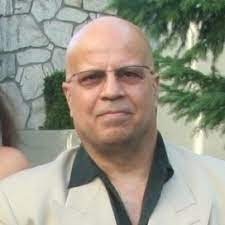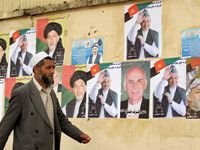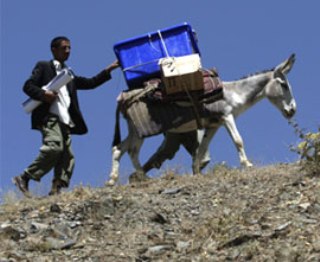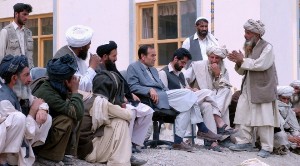By Khalil Nouri STAFF WRITER VETERANS TODAY
Democracies make elections, elections don’t make democracies, and as Winston Churchill pointed out, “democracy can easily become just another way of selecting bad or ineffective governments.”
Democratic elections usually rest on a few basic principles—a free and fair vote, an un-coerced selection of candidates, and an agreement by all parties to abide by the results. Afghanistan however doesn’t quite qualify for any of these.
Evidently the entire troubling pattern of Afghanistan’s presidential election does not offer any hope of improved credibility for the national government or its capacity to govern. Moreover, Afghan politics is not about solving the nation’s crisis: clearly the election is all about ethnic and tribal power struggles. Even though an Afghan national identity does exist, the practical loyalties in everyday life are ethnic and tribal.
Conversely, the neoconservative US policy makers have crafted the argument that if democracy can be spread to Muslim lands, the people of those lands will become better governed, have fewer gripes, and will not be angry enough to consider becoming terrorists. The problem however, is that a significant portion of those policy makers believe in a universal myth; that everyone is a natural liberal democrat, and that the United States should promote the spreading of democracy around the world with an aggressive military spirit. The belief in this myth profoundly translates into a policy that is not only fruitless to win hearts and minds but becomes harmful to US interest.
The Danger
Now that the Afghan presidential decree, crafted in sham, giving precedence that allows the Afghan president to appoint all five members of Afghanistan’s Electoral Complaint Commission (ECC)—specifically engineered to abolish UN body election experts—, all future presidential elections could raise vital legitimacy questions as to continue the existing election processes in a worse turmoil than the last one or change course?
In fact, this recent Afghan presidential decision not only undermines the legitimacy of Afghan governing institutions, it undermines the effectiveness of international electoral assistance as well as the outcome of upcoming parliamentary elections, and severely promotes ethnic tensions that could easily lead to an unmanageable civil strife.
In comparison, Iran (with a 74 million population and 77 percent literacy rate) had a 40 million voter participation in its last presidential election; however, electoral fraud –as in Afghanistan—began before voting had even finished; but the civil contention was comparatively far more chaotic than in Afghanistan’s election. However, Afghanistan still remains a more risky nation due to diverse ethnic feuding, a vastly armed population, and regional players interfering in its internal affairs. Again, the bad news is that; election dynamics and poor election management could exacerbate historic ethnic and North-South tensions, leading to a potentially explosive mix.
The Costs
According to data provided by the Congressional Research Service (CRS), approximately $900 million were spent in fiscal year 2009 to: promote the “rule of law” in Afghanistan, assist in Afghanistan’s election, and aid Afghanistan’s democracy and governance; close to $300 million were allocated just for the election—this is $100 million higher than the 1996 U.S. Presidential primary campaign. Future Afghan elections could cost even higher, and clearly its GDP will not be able to sustain such costs, and thus, the West will have to carry the burden by financing the Afghan election forever.
The Hurdles
The allegations of vote rigging and various ways of fraud; including three million fake voter registration cards, ghost polling stations, combined with the slow pace of vote tabulation and the cumbersome process for investigating complains, all raised political tensions as Afghanistan went through its second presidential election in 2009. This resulted in a second round of election and a runoff.
Currently, there is a deep concern that voter anger could unleash violence along ethnic and regional lines that divide this fragmented society.
Voter intimidation, rocket attacks, finger hackings and 30 related deaths frightened many voters away. Some local election officials and influential local leaders pressed voters to support certain candidates for president and for provincial council seats.
Reportedly, in some 6,202 polling stations approximately 30 percent of Afghanistan’s 15 million registered voters casted their ballots— it turned out to be far less than the 70 percent who voted in 2004. As a result, some analysts have said; a low voter turnout has thrown the results into question.
Additionally, the lack of decent roads in Afghanistan and its craggy and cathedral shaped mountains has led the country to adopt an age-old mode of transport, i.e. ferrying ballots on donkeys to remote regions. Some 3,100 of those animals were obtained to carry the poll materials through towering Hindu Kush range, which severely underscored the logistical difficulties that faced the last election.
Analysis
With almost a decade of the West’s presence in Afghanistan, the Afghan government and the International Community have failed to embed a robust electoral framework and drive democratization at all levels. Monumental corruption, the financial power of narcotic tradesmen, the dominance of elite tribes in the Afghan government—causing imbalance and feud against other tribes—, and the lack of Pashtun voting have cruelly undermined all reforms.
Hundreds of millions of dollars have been spent on what is, essentially, a charade. But that is not the real tragedy of these elections. The lack of anthropological analysis and studies has demonstrated the West’s failure to restore and build peace in this war torn nation; however, the real tragedy is that Afghans now see democracy as a sham. Trust in these past elections had been very low among Afghans from the outset.
As President Barack Obama said, “No person wants to live in a society where the rule of law gives way to the rule of brutality and bribery. That is not democracy… that is tyranny… even if occasionally you sprinkle an election in there.”
Alternate Solution
In light of the chaotic state of affairs surrounded the last election of the “Head of State” in Afghanistan, we believe the best long range solution for choosing future leaders of Afghanistan comes from Afghanistan’s past.
This initiative is an adopted Afghan tribal method, but with a little touch of Western style democracy; it starts by communicating with Afghan tribal leaders and inviting them to a series of leadership conferences outside of Afghanistan. We should first have them meet in several moderate Islamic capitals prior to inviting them to Western capitals; and finally invite them to come as special guests of the United Nations in New York City.
During this process, we will have time to build good relationships with these leaders while at the same time screening out the really bad blood if necessary; while building up the spirit of unity within the group.
What we would be accomplishing by doing this is bringing these leaders into the 21st century while at the same time addressing the legitimate issues that they will all bring to the table concerning their individual tribal groups or Jirgah (grand assembly).
At first, we may be seen as trying to Westernize Afghan leadership; however, by presenting this process as a listening tour for both sides, much can be accomplished.
And, by recognizing today’s status of facts on the ground as well as yesterdays tribal governing traditions, a bridge between yesterday’s successes and 21st Century needs can be created and strengthened. The real goal is to create a true Afghan democracy based on Afghan consciousness and consensus, while brining Afghanistan’s people into the 21st Century.
From this group a number of things can be accomplished, like having these leaders put forth the names of young people who they see as future leaders that can be trained in the ideas of traditional Afghan values as well as 21st Century concepts that will benefit their nation for generations; always with great respect for the full integrity of Afghanistan’s multi-tribal influences.
In Conclusion
From inception before (1500 BC) the Afghans practiced Jirgah-system with two types of councils; first one was (the summit); comprised of elders and tribal chiefs, and second was (Sabha); a rural council used over time for the selection of rulers and headmen.
From the time of the great Kushan ruler—Kinishka—in first century (CE) to the 1970s –King Zahir Shah’s reign—there were sixteen national loya-jirgahs and hundreds of smaller ones called “shura”, or consultative assembly. As evidenced since 1970, none of the heads of state were chosen in the traditional manner. Thus, the sheer drop in “the culture” for choosing the head of state from traditional to Western style democratic election can never be absorbed effectively by Afghans in this swiftness. This is exactly where the policy makers are to step aside, and anthropological expertise placed for attest.
The above introduced proposal; will definitely carry national unity, win hearts and minds, choose the exact candidate –where every day life is ethnic, tribal, and monitored by an elder—and still abide with traditional norms. In addition, it will eliminate chaos, fraud, ethnic strife, cost, and logistical headache to transport ballot boxes, ECC and IEC involvement and many more.
The UN World Commission on Culture and Development Report says, “The relationship between cultural norm and development should be clarified and deepened in constructive and practical ways.”
Perhaps it is time for the international community to rethink its position for a traditional Afghan democracy rather than the existing one, where time has shown that Afghans are not satisfied with the status quo, and are on the verge of forcing change themselves.
Khalil Nouri is the cofounder of New World Strategies Coalition Inc., a native think tank for nonmilitary solution studies for Afghanistan. www.nwscinc.org

Khalil Nouri was born in an Afghan political family. His father, uncles, and cousins were all career diplomats in the Afghan government. His father was also amongst the very first in 1944 to open and work in the Afghan Embassy in Washington D.C., and subsequently his diplomatic career was in Moscow, Pakistan, London and Indonesia. Throughout all this time, since 1960’s, Khalil grew to be exposed in Afghan politics and foreign policy. During the past 35 years he has been closely following the dreadful situation in Afghanistan. His years of self- contemplation of complex Afghan political strife and also his recognized tribal roots gave him the upper edge to understand the exact symptoms of the grim situation in Afghanistan. In that regards, he sees himself being part of the solution for a stable and a prosperous Afghanistan, similar to the one he once knew. One of his major duties at the beginning of Operation Enduring Freedom in Afghanistan in 2002 was advisory role to LTG Franklin Hegenbeck. He has worked closely with the Afghan tribes and his tribal exposure is well tailored for unobstructed cross-cultural boundaries within all Afghan ethnicities. He takes pride in his family lineage specifically with the last name “Nouri” surnamed from his great-grandfather “Nour Mohammad Khan” uncle to King Nader-Shah and governor of Kandahar in 1830, who signed the British defeat and exit conformity leaving the last Afghan territory in second Anglo-Afghan war. Khalil is a guest columnist for Seattle Times, McClatchy News Tribune, Laguna Journal, Canada Free Press, Salem News, Opinion Maker and a staff writer for Veterans Today. He is the cofounder of NWSC Inc. (New World Strategies Coalition Inc.) a center for Integrative-Studies and a center for Integrative-Action that consists of 24- nonmilitary solution for Afghanistan. The function of the Integrative-Studies division (a native Afghan think tank) is to create ideas and then evolve them into concepts that can be turned over to the Integrative-Action division for implementation. Khalil has been a Boeing Engineer in Commercial Airplane Group since 1990, he moved to the United States in 1974. He has a Bachelor of Science degree in Mechanical Engineering, and currently enrolled in Masters of Science program in Diplomacy / Foreign Policy.
ATTENTION READERS
We See The World From All Sides and Want YOU To Be Fully InformedIn fact, intentional disinformation is a disgraceful scourge in media today. So to assuage any possible errant incorrect information posted herein, we strongly encourage you to seek corroboration from other non-VT sources before forming an educated opinion.
About VT - Policies & Disclosures - Comment Policy








